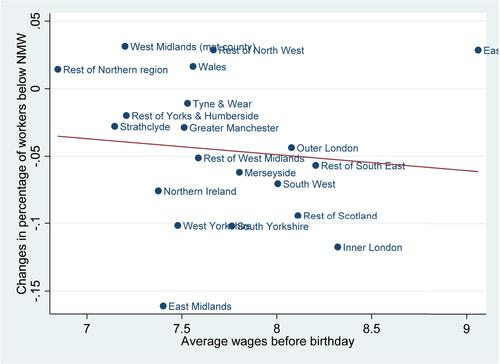国家最低工资对就业的影响是否因非就业率而异?回归不连续性方法
IF 0.7
4区 经济学
Q3 ECONOMICS
引用次数: 0
摘要
我们扩展了回归不连续性模型来评估最低工资的就业效应的顺周期性,并表明由于未能考虑当地的非就业率,先前的估计可能存在偏差。研究结果表明,提高最低工资的积极就业效应具有较强的顺周期性,即在非就业率较低的地区更为明显。假设雇主在截止点附近没有直接影响,结果表明,更高的最低工资增加了年轻工人的劳动力供应。本文章由计算机程序翻译,如有差异,请以英文原文为准。

Does the employment effect of national minimum wage vary by non-employment rate? A regression discontinuity approach
We extend the Regression Discontinuity model to evaluate the procyclicality of employment effect of minimum wage and show that previous estimates may be biased due to failure to account for the local non-employment rate. The results suggest that the positive employment effect of increasing minimum wage is strongly procyclical, that is, is more pronounced in areas with low non-employment rates. Under an assumption that employers have no direct impact around the cut-off point, the results suggest that a higher minimum wage increases labour supply of young workers.
求助全文
通过发布文献求助,成功后即可免费获取论文全文。
去求助
来源期刊

Manchester School
ECONOMICS-
CiteScore
1.80
自引率
9.10%
发文量
37
期刊介绍:
The Manchester School was first published more than seventy years ago and has become a distinguished, internationally recognised, general economics journal. The Manchester School publishes high-quality research covering all areas of the economics discipline, although the editors particularly encourage original contributions, or authoritative surveys, in the fields of microeconomics (including industrial organisation and game theory), macroeconomics, econometrics (both theory and applied) and labour economics.
 求助内容:
求助内容: 应助结果提醒方式:
应助结果提醒方式:


